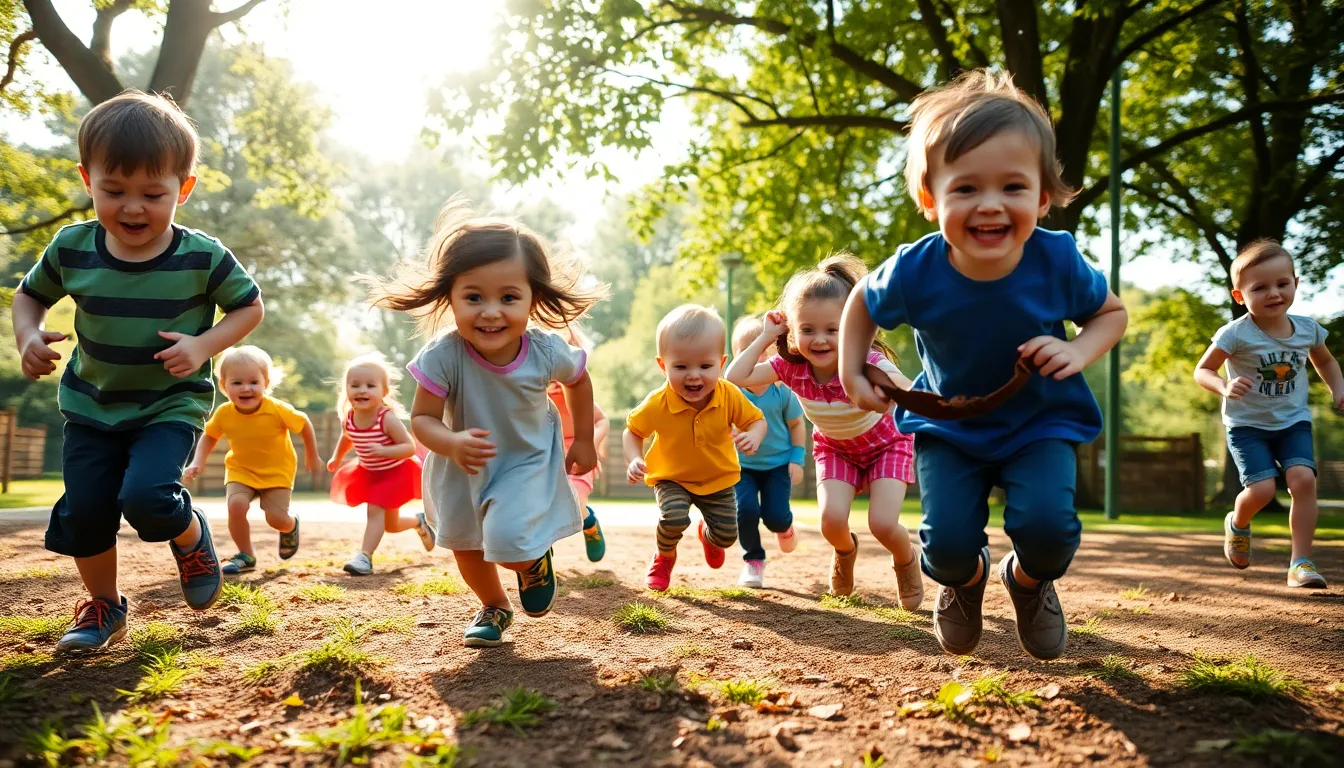Table of Contents
ToggleImagine a classroom where the walls are made of trees and the ceiling is a vast sky. Outdoor preschools are redefining early childhood education by swapping four walls for fresh air and nature’s wonders. Kids don’t just learn; they embark on mini-adventures, discovering the world around them while climbing trees, splashing in puddles, and making friends with squirrels.
What Is Outdoor Preschool?
Outdoor preschool refers to an educational approach focusing on learning in a natural environment. Children interact with their surroundings, facilitating exploration and discovery. They engage in activities such as climbing trees, discovering insects, and splashing in puddles.
This model emphasizes hands-on experiences, utilizing the outdoors as a dynamic classroom. Learning often takes place through play, fostering social skills and problem-solving abilities. Children develop early literacy and numeracy skills by counting rocks or observing patterns in nature.
Programs typically incorporate various outdoor activities, balancing structured learning with free exploration. Involvement in nature helps children gain confidence and independence. Connection to the natural world promotes an understanding of ecology and environmental stewardship.
Many outdoor preschools prioritize unstructured play, allowing children to create their own play narratives. Social interactions occur organically, enhancing communication and collaboration skills among peers. Such environments encourage risk-taking in a safe manner, enabling children to assess their limits.
Research shows children in outdoor preschools often exhibit improved focus and reduced behavioral issues. They benefit from fresh air, physical activity, and exposure to diverse sensory experiences. Overall, outdoor preschool represents a transformative educational model, nurturing well-rounded development.
Benefits of Outdoor Preschool

Outdoor preschool offers numerous advantages that enhance children’s overall development. These benefits particularly manifest in physical development and emotional and social growth.
Physical Development
Outdoor preschool settings promote active lifestyles, contributing to improved physical health. Engaging in activities like climbing, running, and jumping fosters strength and coordination. Children gain better motor skills through natural play, as they navigate uneven terrain and manipulate various materials. They also develop spatial awareness by exploring their environment, which plays a crucial role in overall physical growth. Regular exposure to fresh air and sunlight supports healthy vitamin D levels, boosting immune systems. Outdoor explorations often encourage risk-taking, helping children learn their physical limits while building confidence in their abilities.
Emotional and Social Growth
Outdoor preschool encourages emotional development through unstructured play and social interactions. Children learn to express their feelings while cooperating with peers during group activities. Team-building exercises in natural settings promote communication skills, enhancing their ability to work together. Experiences in nature often reduce anxiety, allowing kids to bond and form friendships. Moreover, children develop resilience by facing challenges in outdoor environments, which contributes to emotional intelligence. They navigate social roles and develop empathy as they share their discoveries with others. This supportive environment nurtures a sense of belonging and helps children understand their place in the world.
Curriculum and Activities
Outdoor preschool follows a curriculum that thrives in natural environments, emphasizing experiential learning through direct interaction with nature. This approach integrates essential developmental skills while inspiring curiosity and creativity in children.
Nature-Based Learning
Nature-based learning immerses children in their surroundings, allowing them to explore ecosystems firsthand. Engaging with elements like plants, rocks, and animals promotes an understanding of biological processes and seasonal changes. Students discover patterns in nature by observing the behavior of insects or tracking animal footprints. Such experiences foster early literacy through storytelling, as children narrate their adventures and discoveries. Counting natural objects, like leaves or stones, enhances early numeracy skills. Health benefits arise from outdoor exploration, including improved concentration and reduced stress, due to exposure to fresh air and sunlight.
Creative Play
Creative play stands as a cornerstone of outdoor preschool activities, encouraging self-expression and imagination. Children craft stories and build environments using natural materials, like sticks and stones, enhancing problem-solving skills. The dynamic nature of the outdoors allows for spontaneous play scenarios that foster collaboration and communication among peers. Options for imaginative games abound, from role-playing as woodland animals to creating art installations with found objects. Such activities promote emotional resilience, as kids learn to navigate challenges while engaging in shared experiences. Engaging in cooperative tasks strengthens social bonds and nurtures empathy, crucial components of early childhood development.
Challenges Faced by Outdoor Preschools
Outdoor preschools face specific challenges that can impact their operations and effectiveness. These challenges include weather considerations and safety concerns.
Weather Considerations
Weather plays a crucial role in outdoor preschool activities. Cold temperatures and rain can limit outdoor play, necessitating indoor alternatives. On hotter days, ensuring children stay hydrated and protected from the sun becomes essential. Adapting activities based on seasonal changes helps maintain engagement and learning. Teachers often modify schedules and lesson plans to align with weather conditions, ensuring children’s comfort and safety. Outdoor preschools regularly provide appropriate gear, such as raincoats and sun hats. With adequate planning, weather challenges can transform into opportunities for creative exploration.
Safety Concerns
Safety remains a priority in outdoor preschool settings. Natural environments present unique hazards, including uneven terrain and potential wildlife encounters. Implementing safety protocols, such as risk assessments and supervision, helps mitigate these dangers. Teaching children about environmental awareness enhances their understanding of safety in nature. Regular training for educators reinforces safe practices during outdoor play. Emergency procedures, including first aid kits and contact information, must always be accessible. By addressing safety concerns proactively, outdoor preschools foster a secure environment for exploration and learning.
Parent and Community Involvement
Parent and community involvement plays a crucial role in the success of outdoor preschools. Engaged parents can contribute to a vibrant learning environment, enhancing children’s experiences and fostering strong connections among families. Volunteers often help with organizing outdoor events, maintaining play areas, and facilitating special projects, further strengthening the bond within the community.
Community partnerships also provide essential resources. Local organizations can supply materials for activities, support educational programs, and offer expertise in areas like ecology and sustainability. When outdoor preschools collaborate with nearby businesses and civic groups, they enrich children’s learning experiences while building a network of support.
Families often participate in outdoor activities, such as nature walks or gardening sessions. This involvement not only supports children’s learning but also strengthens family bonds and promotes active lifestyles. When parents engage in these events, they model positive behaviors and attitudes towards nature and exploration.
Educational workshops for parents can enhance understanding of outdoor education principles. Inviting parents to learn about the benefits of nature-based learning fosters a shared commitment to this educational model. These workshops may include topics like environmental stewardship, child development in natural settings, and safety protocols.
Feedback from parents is invaluable for program development. Regular surveys or informal discussions help educators understand family needs and preferences, refining curricula and activities based on input. Engaging with parents in this way ensures that the outdoor preschool meets the expectations and aspirations of families within the community.
Inclusive events that encourage participation from diverse backgrounds promote equity in outdoor education. Celebrating cultural traditions through nature-themed gatherings fosters inclusivity and respect while providing children with valuable social experiences. Collaboration between educators, parents, and community members creates a rich learning ecosystem that supports children’s growth and development in outdoor preschools.
Outdoor preschool offers a refreshing approach to early childhood education by immersing children in nature. This model not only enhances physical health but also fosters emotional and social skills through unstructured play and exploration. As children navigate their environments they build confidence and resilience while developing critical thinking and collaboration abilities.
The involvement of parents and the community further enriches the outdoor learning experience, creating a supportive network that benefits everyone. With a focus on hands-on experiences and play-based learning outdoor preschools are paving the way for a new generation of learners who are connected to their environment and equipped for future challenges. Embracing this innovative educational model could lead to profound benefits for children’s overall development.




